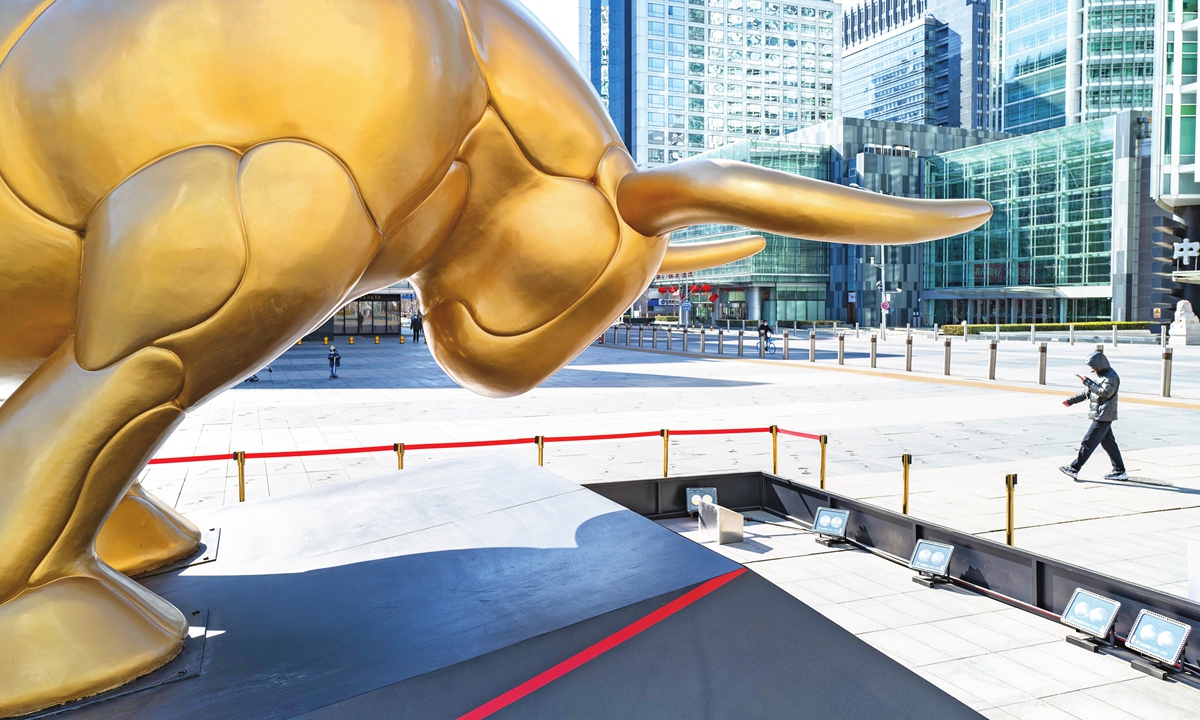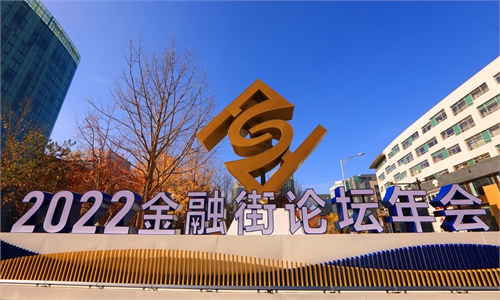China appoints veteran banker to head top financial regulator, 'better serving real economy'

A golden ox statue at Beijing's Financial Street Photo: VCG
China has appointed veteran banker Li Yunze to head a new financial regulator as part of a broader restructuring of the regulatory regime, to oversee the multi-trillion dollar industry.
Li, 52, who has been in the financial industry for 25 years, has been named as the Party Secretary of the National Financial Regulatory Administration, according to an announcement on the official website of the China Banking and Insurance Regulatory Commission (CBIRC) on Wednesday.
Directly under the State Council, or the cabinet, the administration is in charge of regulating the financial industry except for the securities sector. The establishment of the bureau comes as China launches reforms to tighten government control of financial markets.
Industry analysts said that the most important consideration in the reform of financial regulatory agencies is to prevent and defuse major financial and systemic risks to better serve the economy.
Based on Li's experience in major commercial banks, the appointment sends a clear signal that China will steadily push forward and expand the role of the financial industry in serving the real economy, Dong Dengxin, director of the Finance and Securities Institute of the Wuhan University of Science and Technology, told the Global Times on Wednesday.
"The new head's primary mission is to lead the bureau's work in two important aspects. One is definitely to further advance China's financial reform, and to further improve the efficiency and quality of the financial sector in serving the real economy. More measures in this area are expected to be rolled out," Dong explained.
The second is to safeguard China's financial security, in particular to deal with potential financial risks amid a volatile external environment, he noted.
The new head's primary mission is to truly manage the entire financial chain, including the market, to prevent systemic risks, Dong Shaopeng, a senior research fellow at the Chongyang Institute for Financial Studies at the Renmin University of China, told the Global Times on Wednesday.
He needs to do research first, especially on the current risks of local real estate debt, and launch other systemic measures relatively quickly, Dong Shaopeng said, adding that his focus of work would be strengthen the public supervision of financial services.
In public speeches, Li has paid much attention to financial support for supply-side structural reforms, financial risks, fintech, protection of depositors' interests and retail finance.
In June 2017, Li, then vice president of Industrial and Commercial Bank of China (ICBC), said at the Lujiazui Forum in Shanghai that financial institutions should assume the basic function of financial institutions as a loan intermediary, and to allocate financial resources efficiently in accordance with the effective supply required for economic development.
In a forum held in Guangzhou, South China's Guangdong Province in March 2018, Li said that the essence of fintech is still finance, and risks must be effectively prevented, including protecting the interests of depositors and reducing accounting risks.
Li has worked in the nation's largest state-owned banks - China Construction Bank - for 23 years and ICBC for two years.
In September 2018, he was appointed as the vice governor of Southwest China's Sichuan Province. During his tenure in Sichuan, Li was responsible for the establishment of the Sichuan Provincial Bank, reported thepaper.cn on Wednesday.
China's banking sector resolved 3.13 trillion yuan ($452 billion) worth of non-performing assets in 2021, effectively reducing credit risks, official data showed. The figure increased by 0.11 trillion yuan from a year earlier, a record high, according to the CBIRC.
During the 2017-21 period, China's banks resolved 11.9 trillion yuan worth of non-performing assets, which surpassed the aggregate of the 12 previous years, and served as a key backstop against systemic financial risks, the commission said.


